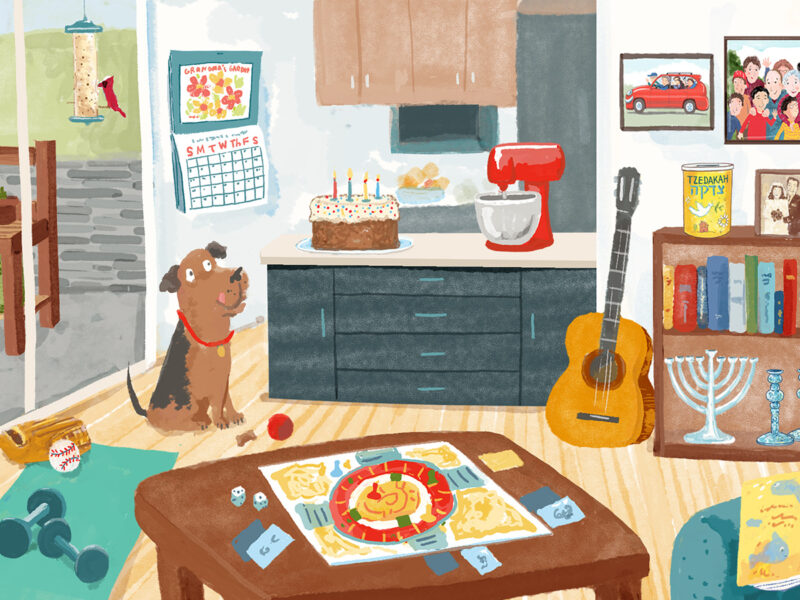For nearly a century, Portland Jews have organized to take care of the community’s elderly in ways that maintain dignity and honor.
From the first efforts to the most recent plans, the emphasis has been on the highest standards of care, and the importance of providing a place that can be home.
“Elders – and particularly elders with cognitive issues – do better in a setting that is home, or home-like,” says David H. Fuks, chief executive officer of Cedar Sinai Park, the umbrella organization for a growing number of services for older people and others in need of community support.
In fact, Cedar Sinai’s newest facility – a nursing home Fuks hopes to open in 2015 – has the working title “A Place to Call Home.” It’s being designed for 48 residents, each in “living groups” of 12, with private rooms, common areas and dedicated staffing.
“Living in households is familiar,” Fuks continues. “All of those simple things – kitchens, refrigerators, living rooms – help us be oriented. And we can help people to access their capabilities even as they face issues of decline.”
The new is not a return to the old “Jewish Old Peoples Home,” Fuks said. But it is a return to a home-like setting. And it will continue the community’s commitment to provide the best care it can.
That commitment began in 1916, when the Jewish Women’s Endeavor Society, a charitable group, remodeled its building at 647 SW Fifth Ave. to house older people in need. And it was strengthened when the women’s group joined forces with a group of men who in 1920 formed the Old Men’s Hebrew Fraternal Organization in Old South Portland.
That group, whose first president was Leib Shank, bought a 16-room house on Southwest Third Avenue and College Street – asking price $11,000 – that became “The Jewish Old Peoples Home.”
Steven Lowenstein, writing in The Jews of Oregon: 1850-1950, noted that “the home provided individual, pleasant rooms for each elderly resident, served kosher food at a large dining room table and maintained a chapel for worship.”
A sisterhood group, also organized in 1920, helped to raise money for and provide services to the home.
“Compassion was the motivation,” says Donna Jackson, president of the Robison Jewish Health Center Sisterhood, the current name of the sisterhood group. Jackson remembers going to sisterhood “Silver Teas” as a child with her mother and grandmother.
“Sisterhood provides the extras,” she adds, “whether it was lemon drops and handkerchiefs, or furniture for the Home’s living room.” She says the Sisterhood raises about $20,000 annually.
The current nursing home, the Robison Jewish Health Center, opened in 1955 and was named in honor of Hannah Robison, a remarkable woman who supported an array of local and international Jewish organizations.
Fuks recounts a story: “During the Depression, Mrs. Robison used to walk around her block in Old South Portland with a couple of bags in her hand. If people had something extra, they’d put it in the bag. If they needed something, they’d take out. But no one knew who was taking and who was putting in. I love it that we do business in honor of someone like that.”
Fourteen people, ranging in age from 77 to 107, were the first residents at the new home, which could accommodate a total of 44. Over the years, infirmary and Alzheimer’s wings were added, and the campus expanded to include retiree apartments and assisted living, as well as adult day care, respite and home care services. Today, Cedar Sinai Park also operates a downtown Portland residence for low-income elderly, and is planning to add apartments for adults with developmental disabilities to its campus.
Throughout, there’s been strong community involvement.
The late Harold J. Schnitzer recalled going to the old Home in South Portland with other students at the Portland Hebrew School to conduct weekly religious services. “It was a very good experience for both the young and the old,” he said. “The compassion and care that we try to give to our senior citizens is the embodiment of the highest ideals of our religion.”
Schoolchildren continue to visit, a religious services committee sees to it that spiritual needs are met, and volunteers help with everything from arts and crafts to social activities and gardening.
“We are in the business of taking care of each others,” says Fuks. “And every individual should be able to live with dignity.”
For most of the past century, the “Jewish Home” – its predecessors, its successors and its extended family – has helped to make that possible.
_______________________________________
TIMELINE
1916 – The Jewish Women’s Endeavor Society remodels its Southwest Portland building and makes it available to elderly persons needing shelter
1920 – The society combines efforts with the Old Men’s Hebrew Fraternal
Organization, which purchases a large house on SW College Street and opens
the Jewish Old People’s Home. A sisterhood also organizes.
1945 – The home’s name is changed to the Jewish Home for the Aged.
1954 – Groundbreaking for a new home in Southwest Portland.
1955 – The Robison Jewish Home, named in honor of Mrs. Hannah Robison, opens.
1981 – May Terrace Apartments for retirees opens on the Robison campus.
1996 – Campus is renamed Cedar Sinai Park
1998 – Rose Schnitzer Manor, assisted living facility, opens.
1999 – Adult Day Services program opens, providing flexible respite care to families.
2002 – The Shlim Wing, an addition to Rose Schnitzer Manor, opens.
2007 – Sinai Family Home Services is launched to support in-home care of elderly.
2007– Rose Schnitzer Tower in downtown Portland, offering affordable housing for seniors and people with disabilities, joins the Cedar Sinai family of programs.
In development: Kehillah Housing, 14 affordable housing apartments for adults with developmental disabilities, on the Cedar Sinai campus.
“A Place to Call Home,” a new nursing home for 48 residents in a home-like setting, also on the Cedar Sinai campus.
____________________
Sources: Cedar Sinai Park, The Jews of Oregon: 1850-1950 by Steven Lowenstein




